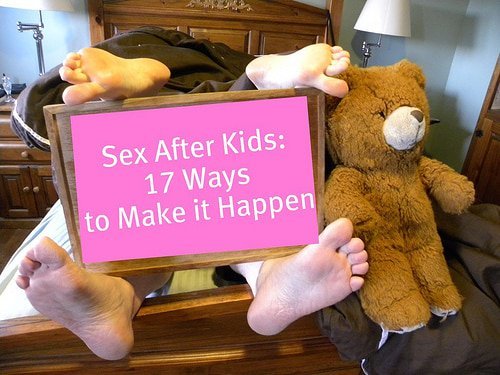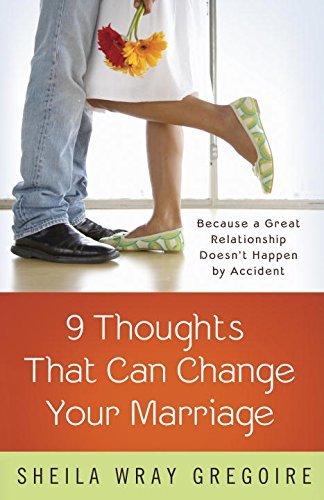Sheila Wray Gregoire's Blog, page 83
May 15, 2019
Sex Ed for Christians: The Theology of the Penis
What does the penis, or male genitalia in general, teach us about God, about marriage, about the sexes?
This month I’m trying to expand on sex ed for adults in our Wednesday themed posts, and I want to talk today about what the penis tells us about God. So far we’ve looked at 10 things to know about women and arousal, and about the theology of the clitoris. So now let’s turn to the theology of the penis!
I’m going to be honest: this was much more difficult to write than the woman’s one. For a while, all we could think of was,
“Sometimes, life gets hard. Then it’s not. Then, at inconvenient or awkward times, it gets hard again. Especially during the teenage years.”
But we decided that would be in exceptionally bad taste.
Many (including Pope John Paul II) have written more doctrinal works on this (and have been in much better taste), that have encompassed far more than just the sexual function of the penis. Today, though, I want to focus just on the sex act here, since that’s what I tend to write about. So what do we learn about God and God’s design for sex from how the male anatomy works?
Sexual attraction is natural
First, at its most basic, intercourse only works if the man is aroused. On the arousal timeline, he feels desire (libido); excitement (arousal); stimulation (intercourse & orgasm) and recovery.
But he has to be aroused, or nothing works! So God created men to be quite easily aroused (in general). If you compare bell curves of women’s libidos and men’s libidos, you’ll find that they overlap, with men’s libidos, in general, being higher. This doesn’t mean that there aren’t some women with higher libidos than some men; but in general, men tend to have an easier time getting aroused and staying aroused than women do.
And this is the way that we are designed! Sexual attraction, then, is a natural thing that most men feel. It is not a sin. They’re wired to be attracted to women sexually so that sex is easier to do. If men were as hit and miss regarding arousal and sexual response as women are, then sex would be far less frequent and far more disrupted.
(Again, this is not to say that some men don’t suffer from sexual dysfunction or low libido; only that in general men’s arousal is more automatic than women’s.)
We should stop framing sexual attraction as a sin, then. As I’ve said before, and as I’ll write more about soon, noticing is not lusting. You can notice a woman is beautiful and then do absolutely nothing else with that thought. By telling men that every time they notice a beautiful woman they’re in sin, we’re putting men in an impossible situation.
Other Posts in our Every Man’s Battle Series on Lust:

Why Every Man’s Battle Backfires

Is Don’t Be a Stumbling Block a Really Bad Modesty Message?
Sex, for men, is about being accepted and “let in”
While women can have sex when they don’t want to (something that is tragic for all too many women), men tend to need to be into it to perform. (This doesn’t mean that men can’t be raped; bodies will respond to stimulation even if you don’t want to, and that’s called arousal non-concordance. Additionally, men can be raped via anal sex. But in a relationship, in general, men can’t have sex unless they want to).
What many men are looking for, then, is for a woman who also wants to have sex. Good husbands want to be wanted; they don’t want to be placated. Sex is actually about a man entering a woman’s body and leaving a part of himself there. Sex is, then, about a man being accepted. Her wanting sex means that she wants him. She wants to experience his desire and his excitement, and she wants to be the object of it. When she is enthusiastic about sex, then, he feels wanted and accepted.


10 Ways to Make Sex Feel Amazing for Him
Sex requires men, in general, to woo women
Men feel arousal quite easily and often quite intensely, but they also have this need to feel accepted (literally “let in”). For this to happen, then, they have to get women to actually want them. Certainly a bad man can force a woman, but that only satisfies lust; it doesn’t satisfy the emotional need to be accepted that men also have. Their libido and easy arousal, then, becomes a God-given impetus to woo their wives. If they want willing partners, they need to build the relationship and the emotional connection so that she is willing to be vulnerable with him. His libido, when channeled correctly, actually feeds a more intimate relationship.
Men’s area of greatest pleasure is also their area of greatest vulnerability
Men’s genitalia is the focus of the greatest pleasure that they can feel–but it is also their most vulnerable point. Want to bring a man to his knees? Kick him you-know-where. Every basic self-defense course teaches women this. Go for the testicles!
Why is that? I’m going to suggest that it’s to remind men that this part of themselves that can all too easily take over the relationship and dominate a woman can also become his biggest downfall. It’s to remind him that he is vulnerable. He needs to use his body correctly, or he risks being hurt, and hurting others.
Does your marriage need some spicing up–and some fun?

Try these 24 dares–plus one bonus–to take your marriage to the next level!
Let's add some heat!
Men need to stay in control–of themselves
If men want to avoid this vulnerability, then, they need to stay in control–of themselves. One of my faithful readers, Phil, pointed this out to me in the comments last week. If sex is going to go well, men can’t let themselves get carried away. They have to think of the woman who is with him, to make sure that she is enthusiastic, enjoying herself, and accepting him. He has to make sure he doesn’t overpower her, which is all too easy to do.
Sex can become like a conquest–you dominate her and she submits to you. But for sex to be all that he wants it to be, with a partner who accepts him and is enthusiastic, it must be so much more. And that means not allowing your base instincts to run wild. You must instead temper them with love, with deliberation, with generosity. That makes the stronger look out for the weaker, and it makes sex far more about giving than it otherwise could be.
You’re supposed to serve God–even with that part of you
While we know from the New Testament that circumcision is no longer a requirement to be a part of God’s covenant family, it was the marker of covenant faithfulness from the time of Abraham to the time of Christ. In fact, Paul uses the analogy of circumcision in Romans 4 to describe baptism, which has now replaced circumcision as the sign of our belonging to the people of God. Circumcision was only performed on men, not on women, as circumcision of men does not inhibit their sexual function while female genital mutilation definitionally does affect a woman’s ability to enjoy sex.
By submitting to circumcision and participating in circumcision rites for their sons, the Israelites submitted their whole selves, including their genitalia, to God’s covenant. So what does circumcision actually tell us about how God sees men’s sexuality?
Circumcision is a sign of being in covenantal relationship with God–and that sign was done on that part of the body. There’s all kinds of reasons for that (it was the part of you that had children; it was the part of you that was the most intimate), but I think one of them is telling us that at its most basic, we must serve God even with that part of us. We’re in a covenantal relationship with God, and that includes our sex drives and our sexuality.
So your sex life is supposed to come under submission to God. It isn’t an animalistic force that cannot be contained.
Much teaching about sex in the church describes male libido as an unwieldy force that every man must battle at all times. It is as though many in the church believe the Spirit is impotent when it comes to the problem of male lust. Of course, that is ridiculous. While many men struggle with lust, many others do not. God’s original design was not that we serve God in everything EXCEPT our sex drives, which can’t be tamed (so women have to tame men for them by not causing lust). No, God’s design was that we serve God in everything, ESPECIALLY our sex drives. So let’s stop talking about sex as the one area that men are unable to submit to God because lust is so overpowering. We as a church should come alongside the struggling while nevertheless expecting holiness and “spurring one another on towards love and good deeds” (Heb 10:23, NIV).
What do you think? Is there something that I missed? I did find the women’s version easier to write! So let’s talk in the comments!
Author
Social Media
Sheila's Best Posts
Books
Courses
Freebie
 Sheila Wray Gregoire has been married for 27 years and happily married for 22! She loves traveling around North America with her hubby in their RV, giving her signature "Girl Talk" about sex and marriage. And she's written 8 books. About sex and marriage. See a theme here? Plus she knits. Even in line at the grocery store.
Sheila Wray Gregoire has been married for 27 years and happily married for 22! She loves traveling around North America with her hubby in their RV, giving her signature "Girl Talk" about sex and marriage. And she's written 8 books. About sex and marriage. See a theme here? Plus she knits. Even in line at the grocery store.
 Find Sheila Here:
Find Sheila Here:
Facebook
Twitter
Instagram
YouTube
Pinterest
Sheila's Favorite Posts on To Love, Honor and Vacuum:
10 ways to initiate sex
10 Effects of Porn on Your Brain, Marriage, & Sex Life
Why So Much Marriage Advice is So Trite
How can Sex be Hot and Holy at the Same Time?
Check out some of Sheila's Books:
The Good Girl's Guide to Great Sex
31 Days to Great Sex
9 Thoughts That Can Change Your Marriage
To Love, Honor, and Vacuum
Check out Sheila's Courses:
The Boost Your Libido Course
The Whole Story: Talking to Your Daughter about Sex, Puberty, and Growing Up
The FREE Emotional Intimacy E-Course
Are you ready to take your marriage to the next level?
Sign up for our emails and get access to the TLHV free marriage and parenting resource library. We have over 25 downloads and are constantly adding more. Sign up here!
May 14, 2019
The Top 10 Searches that Land People Here: The Good, the Bad, and the Ugly
People land on To Love, Honor and Vacuum in all kinds of ways!
It may be links they saw on Twitter or Facebook. It may be posts that people emailed to them.
But the two most common ways are Pinterest and Google–with Google being the biggest one.
And because so much of my traffic comes from Google, I can learn a lot about the kinds of people who read the blog from the kinds of searches that land them here! After all, I write a whole lot of different kinds of posts. Some are happy ones about how to make your marriage great. Some are technical ones about how to make sex great. Some are slice of life posts or things about the Christian walk. But a lot are posts about troubles that people are having in marriage, and often those drive the most traffic.
Here’s what’s cool about Google. If someone’s in a crisis in their marriage, and they type that crisis into the search bar (“I caught my husband texting another woman”), and I pop up, then when they’re looking for help for marriage, they’ll wind up here, where hopefully they’ll find some practical advice from a Christian perspective.
It’s funny, when I was younger I always wanted to be a missionary (and Keith and I still plan on going back to Kenya sometime soon!). But what’s neat is that I have thousands of people from Africa, or India, or even from the Middle East showing up here everyday for help with their marriages. It’s outreach, all on its own! (and if you ever want to be part of a prayer team for that aspect of this ministry and this blog, you can join here!).
So here’s a look at the 10 most common searches that send people here:
The Happy Searches that land people on To Love, Honor and Vacuum:
Maybe happy isn’t the right word, but these searches don’t mean that people are in crisis. They just may want to get a better marriage! So here they are, in descending order:
1. How to satisfy my husband
I’m hoping people aren’t searching this because their husbands have told them that they’re bad in bed or something, but I do have a post on how to make sex feel great for him!

10 Ways to Make Sex Feel Awesome for Your Husband:
I have a lot of posts on this blog on how to make sex feel great for HER (or for you, really!). And it makes sense, because let’s face it: usually, when you’re making love, no matter what you do he ends up satisfied in bed, while often you’re left unsatisfied. So it seems like we women need more help in that department.
But just because he’s often satisfied doesn’t mean that we can’t turn up the notch and make sex feel even better! Here’s how:
2. Hobbies/Conversation Starters for Couples
Definitely a happy one! People want to know about hobbies to do as a couple, or about my conversation starters for couples. What I’m hoping they’ll also do is sign up for my emotional connection email course, which can help bring them even closer.
3. “How to Initiate Sex”
One of my all-time most popular posts, 10 ways to initiate sex with your husband! I also have a follow-up to it: 10 ways to signal to your husband that tonight’s going to be a good night!

10 Ways to Initiate Sex with Your Husband
With 4 things NOT to do (don’t overthink it, don’t be embarrassed, and more!), and 6 things to do to help you feel less awkward, here are 10 tips that will make initiating sex a lot more natural for you–and more fun!
4. “Adventurous sex”
Now, people could be searching for this wanting some seriously X-rated stuff. But I’m hoping that it’s simply tips to help us relax and try new things! Really to adopt more sexual confidence and relax more. They get sent here:

10 Ways to Be More Adventurous in Bed
Want to get more adventurous in bed? Are you shy to suggest anything new? Here are 10 ways to be more adventurous!
(And try this if you feel like your husband WON’T get adventurous.)
5. “How to Flirt with Husband”
This was a HUGE post on Pinterest a few years back, and it was my top traffic generator for a few years. 16 ways to flirt with your husband (and if you sign up for the newsletter, I’ve got a downloadable freebie with 25 ways!).
The Sad Searches that land people on To Love, Honor and Vacuum:
Not all of the searches, though, are happy ones. Here are some with sad overtones:
6. Wife Doesn’t Want me/Wife rejects me all the time
A LOT of the people who end up on this site from Google are actually men. And here’s the most common search term: something about how a wife hates sex. In this case, they’re usually being sent here:

10 Reasons Why Your Wife Doesn't Want Sex
Here are all the reasons that women tell me they may say no–from feeling exhausted to not feeling emotionally connected to sex just plain not feeling very good.
Guys can read this and see if any of them resonate–and then go to other posts that help them talk to their wives about how they’re feeling.
7. Porn Addiction Side Effects
This is actually the one I’m MOST excited about having rank in the top 10. The only problem is that it used to be a lot higher, but because the post is older now Google isn’t giving it as much juice. But my prayer is that more people land on this post when they’re looking for the effects of porn, because maybe they’ll learn that it is worth quitting! There’s so much toxic information about porn on the internet, and I’d so much rather they end up here.

The Top 10 Effects of Porn on Your Brain, You Sex Life, and Your Marriage
Porn is not harmless!
And in this post I list 10 of the most common effects, including a loss of libido, an increase in erectile dysfunction (and other sexual dysfunction), a loss of intimacy, and more.
If you’re talking to teenagers about why they shouldn’t use porn, it’s more effective to show them a post like this than to just say, “God doesn’t want you to do it!”
8. “I cheated on my husband”
I’m surprised this ranks so high! Google has recently found me for this search term. We tend to think that it’s husbands who have the affairs, but I get a lot of emails from women who have cheated, too.

How to Rebuild Your Marriage--When You're the One Who Cheated
How do you recover from an affair if you’re the one who strayed?
I actually get that question a lot on the blog–and so I’ve got 8 things to remember in this post. Here’s just one:
Allow Room for Anger
You may think that several months have gone by, and things are progressing, so he shouldn’t be angry anymore. But it’s often just as you are starting to talk that his anger starts really surfacing. Now he may have a lot of questions–what did you do with that guy? Tell me in detail! What were you thinking when you spent all that money? etc. etc.
When he starts demanding answers, don’t say, “I’ve said I’m sorry! What else can I say? You seem to want to punish me indefinitely!” That may be natural, but he does need time to get his questions out. I’d advise answering them as honestly and succinctly (you don’t need to go into a lot of detail) as you can.
Also, avoid the impulse to defend yourself. “I wouldn’t have had the affair if you had shown some interest in me!” Or “If you hadn’t spent so much time on video games maybe I wouldn’t have felt so lonely!” Those are real issues, and do need to be dealt with. But leave them for another time, or bring them up with a counselor. For now, let him express his anger. Once you have talked about his issues, you can say, “I don’t ever want to be tempted in this way again. Can we talk about how to build our relationship so that neither of us ever strays?” Then you can mention some of your issues–video games, for instance. But leave this until after he has had a chance to deal with his anger.
9. “Sex boring”
Sex shouldn’t be boring! And if it is, here’s a pep talk I gave about that:

Sex is SO Boring!
You know, it really shouldn’t be.
And so if it is–it’s up to you to figure it out! That may take some work. But life shouldn’t be something that happens to you. It should be something that you intentionally live out!
I lay out the reasons that sex gets boring in this post, and then show the mindsets that need to change to figure out how to make sex an exciting part of your relationship again.
10. “Husband prefers hand over me”
When I asked Connor to find the top 10 searches on this blog for me, I was not expecting to see this one! But apparently a lot of people end up here with that problem! Wow. I’m going to have to write more about that (and boy is that sad). But when they type that in, they get sent to this post on red flags in marriage:

Top 10 Sex and Marriage Red Flags You Shouldn't Ignore
Sometimes I get sent horrible emails from women who are in awful marriage situations–but they don’t seem to know how bad it is.
We simply don’t talk about sex very much with our friends, and least not in detail, and so we don’t always realize when our experience actually is strange.
So I thought it was worth being very clear about 10 things that AREN’T normal, and that should cause you concern. (and, yes, your husband preferring masturbation over sex is one of them!)
So now you’ll have a feel of how people find me. And you’ll see why I consider Google a mission field! From Pinterest I tend to get people looking for more generic, happy posts on marriage, so that’s good. But a lot of people who land on the site really are in crisis, which is likely why I get so many sad reader emails.
I’d love to know in the comments: How did you find me? What were you looking for? Let me know!
And I’ll be giving away a copy of my 24 Sexy Dares to someone who comments before Saturday! So leave a comment! 
May 13, 2019
How Do I Protect Our Kids from Our Marriage Problems?
How do you give your kids a healthy view of marriage…if your marriage isn’t healthy?
Every Monday I like to post a reader question and take a stab at answering it, and today I’ve got a similar question from two hurting wives who are worried about the effects of their marriage on the kids:

Reader Question
I was 7 months pregnant when he confessed to porn use.
Glory to God, we are in a miracle and my husband is healing and we are healing and our lives are being restored. Interesting, you recently wrote about when to invite the husband back to the bed after betrayal. I’m getting to a place for that, slowly as we are growing in emotional intimacy again.
How can I help my children recover from all the trauma of my husband’s fallout? My son was just two when my husband confessed and he witnessed all my heartache and anger and the fights between us (We lived in a 1200 square foot home at the time- no where to hide.) my daughter was in the womb still and although she seems to be miraculously healthy I still wonder about the long term effects of all I went through emotionally while she was not yet born.
Another woman writes:

Reader Question
Parenting experts often say the best thing you can do for your kids is work on and have a good marriage. This crushes me because so many of our marriage issues are not my issues and I can’t control them. Nor can I pretend we’re in love to somehow make the kids feel secure.
So… for those of us who can’t just conjure up a good marriage how can we model this to our children without making them even more insecure?
Great question! Let’s look at it today.
God Can Protect Your Kids’ Hearts
A mom’s heartbeat is to protect her kids. We want, yearn, NEED to protect them.
But in this rush to protect them, let’s not forget that we are not all-powerful. Sometimes I think we feel that we are more powerful than we really are–that we should be able to smooth over life for our kids and we should be able to make sure our kids turn out well.
Our ultimate calling is not to protect our kids; it is to point them to Christ.
When they understand the love of Christ–how high and long and wide and deep it is–then nothing else can get them. They are safe. They will be able to turn to Christ in their problems, and define themselves through what Jesus did for them, and not what others have done to them.
Bad things are going to happen to your kids. For yours, it may be that their lives started out in a tumultuous situation because your marriage was bad. But for others it may be living in a bad neighborhood and being bullied; having someone they love die; living several years through great financial hardship.
Life happens.
And in all of that, God is there. And while we can’t protect our kids, let’s never forget that He can.
Our past does not need to define us.
Yes, it is true that those who grow up in a shaky nuclear family do worse overall than those who grow up in a functional, loving, stable home. But note the word “overall“. That’s based on studies of thousands and thousands of kids. It isn’t based on a study of YOUR kid.
I grew up the only child to a single mother. If you look at the studies; you would not have predicted that I would be an A student; that I wouldn’t become promiscuous; that I would finish graduate degrees in university; that I would marry well. But I did, because God protected me, showed His grace to me, and led me to Him.
I have known friends who lived through horrendous abuse and family situations as young children who are honestly fine now. And then I have known others who lived in a stable, nuclear family with two parents who loved them who struggle to cope with the littlest thing going wrong in life.
Individuals are not statistics, and your children are individuals. Their past does not write their future; it is about how their past interacts with their personalities, with your characteristics, with other circumstances–but most of all, with God’s grace.
If you live your life scared that your children will turn out hurt because of what is done to them, they very well might. But if you proceed forward deeply in prayer for them, and focus on their individual, unique personalities, life really can be limitless. Just because a person has some struggles doesn’t mean that they can’t succeed well in relationships later or in faith later. Pray, point them to Jesus, and enjoy them in the present!
Authenticity Matters More Than Perfection
But what if the problems continue?
The second letter writer is asking, “how do I show kids a healthy marriage when ours isn’t healthy?”
Jesus is the Way, the Truth, and the Life. He isn’t in perfection; He’s in Truth, and truth is often messy.
When I wrote about the Duggar scandal when that first broke, I said that authenticity matters so much in our witness–likely more than anything else. And it matters more than anything else in raising our kids, too. When we are honest with them, they are free to be honest. When we tell them, “you can’t ever criticize the family”, or “it’s a betrayal if you don’t think we’re perfect” (you wouldn’t SAY this, but you may SHOW this), then kids don’t know what to think. When they see something that’s wrong, they feel inner turmoil. To admit it’s wrong (or even to believe that it’s wrong) means that they’re betraying their family, and they can’t stand to do that. And so they push things under the surface and learn not to believe their own red flags. That doesn’t bode well for future relationships.
Being authentic is the best way to connect with your teen.

That’s what I found again and again when I interviewed 25 young adults to figure out what made teenage rebellion more or less likely. So what does authenticity actually look like in a family?
Hint: you may need to throw out most of the parenting advice you’ve heard.
Here's what I found!
Truth is a gift that you can give your children.
In your marriage, even if there isn’t love, and even if your husband acts inappropriately at times, you can be kind. You can refrain from sniping at him. You can talk with him and not withdraw.
But you can also draw appropriate boundaries (for instance, if he yells, you can say, “I see that your angry, and I do want to talk to you about this, but I won’t stay in the room while you yell, so once you’re calmed down I’d be happy to talk”, and then you can leave the room.) You can treat yourself with respect, and act with in ways worthy of respect. You can show them that while our relationship may not be perfect, I am trying to live as Christ did and point people to Christ.
When your children see that you honor your husband, but that you also honor yourself and do not get sucked into counterproductive arguments, then you show them that loving someone does not mean allowing them to treat you badly.
I’m going to assume that the issue here is not one of emotional or verbal abuse, though, because I know the second letter writer a little bit, and I believe that she would not put up with that. I also believe that if the issue is one of abuse, removing yourself and your children from that situation is the best course of action, but I’m not directing that here because I’m proceeding as if it’s not abuse but just simply bad decisions or bad modes of interacting on the part of the husband.
Maybe it’s simply that he’s a workaholic and you have no relationship. Perhaps he has no relationship with the kids, either, and you know how important a father’s relationship is. And that’s what you worry about.
You can involve their dad when he’s willing, but you can also make sure that you do fun things with the kids without waiting around for their dad. You can involve uncles in their lives. They’ll understand when they grow up. They’ll know that their dad made bad choices, and they may not have a great relationship with their dad. But a bad relationship with their dad does not necessarily mean that they’ll have bad relationships in general at all. Not if you’re walking in Truth; allowing them to speak Truth with respect; and letting them be in healthy church communities where they can see other men who do treat their families well.
Watch How They Speak to Their Dad–But Permit Honesty
Don’t worry so much about your kids that you create rifts with between them and their father. I have seen countless marriages where the mom is so worried about how the dad treats the kids that she’s forever telling the kids, “it’s okay to be mad when your dad does that,” or “your dad just doesn’t understand you.” Don’t foment anger.
But if your child is upset with your husband your child starts the conversation, it’s okay to say, “how does Jesus want us to handle it when we’re upset?” And it’s okay to encourage your child to take it up with your husband. You should expect a child to show a dad respect and not call him names, but it’s perfectly appropriate for a child to say, “when you did X it hurt me,” or “when you didn’t show up I felt angry.”
Let your child have those conversations and don’t interfere. Naming feelings is important, and if a child or teen can speak them out loud when they’re still children, that’s often healthier than growing up without ever being able to speak the disappointment. Just be careful that in your quest to guard your kids you don’t cement this “Mom is good and understands me and Dad is distant and is a loser” mentality. If you’ve chosen to stay in the marriage, then stay in that marriage. Treat your husband with kindness. Speak of him well. And pray hard.

Let me ask you: Have any of you dealt with this? How do you protect your kids without encouraging them to be angry at their dad? Let’s talk in the comments!
And if any of you are struggling with how to have those hard conversations with your kids or how to explain the more difficult things of life with them, check out Why I Didn’t Rebel. It’s got some great stories that can help illuminate some of the more complex or grey areas of parenting to help you make the right decision for your family.
Author
Social Media
Sheila's Best Posts
Books
Courses
Freebie
 Sheila Wray Gregoire has been married for 27 years and happily married for 22! She loves traveling around North America with her hubby in their RV, giving her signature "Girl Talk" about sex and marriage. And she's written 8 books. About sex and marriage. See a theme here? Plus she knits. Even in line at the grocery store.
Sheila Wray Gregoire has been married for 27 years and happily married for 22! She loves traveling around North America with her hubby in their RV, giving her signature "Girl Talk" about sex and marriage. And she's written 8 books. About sex and marriage. See a theme here? Plus she knits. Even in line at the grocery store.
 Find Sheila Here:
Find Sheila Here:
Facebook
Twitter
Instagram
YouTube
Pinterest
Sheila's Favorite Posts on To Love, Honor and Vacuum:
10 ways to initiate sex
10 Effects of Porn on Your Brain, Marriage, & Sex Life
Why So Much Marriage Advice is So Trite
How can Sex be Hot and Holy at the Same Time?
Check out some of Sheila's Books:
The Good Girl's Guide to Great Sex
31 Days to Great Sex
9 Thoughts That Can Change Your Marriage
To Love, Honor, and Vacuum
Check out Sheila's Courses:
The Boost Your Libido Course
The Whole Story: Talking to Your Daughter about Sex, Puberty, and Growing Up
The FREE Emotional Intimacy E-Course
Are you ready to take your marriage to the next level?
Sign up for our emails and get access to the TLHV free marriage and parenting resource library. We have over 25 downloads and are constantly adding more. Sign up here!

May 10, 2019
Grappling with Mother’s Day if You’ll Never Be a Mom
But there are many women on this blog and in our communities who struggle with infertility, miscarriages, or infant loss.
If that’s your story, today I wanted to dedicate this space to you. You are seen, you are loved.
I have a guest post from Amy Frazier, a Christian musician, sharing her story with us today. This is moving, and she has some great words of wisdom for us.
Here’s Amy:
“We are getting a pregnancy test and I am driving us to Wal-Mart right now!” yelled my sister.
We had a huge fight, and this wasn’t like me. She took me to the aisle and raced home so I could take it.
Just as my sister thought, it proved to be positive. This wasn’t the first time I’ve seen the plus signs. To be honest, I was scared to death that I was pregnant again. I already had three miscarriages and going through another one would be an impossibility for me.
On this particular day I was visiting my family in Oklahoma.
My husband and I were living in Alaska at the time, and because flights were so expensive, he stayed behind so I could enjoy a family getaway. After my test, I called Jared immediately. I could hear his excitement over the phone but also concern due to all the battles we’ve faced before.
I remember feeling really scared to do anything after that. I watched everything I put in my body, didn’t really exercise and every trip to the toilet was carefully monitored. I was living on the edge so to speak, praying and trying to stay relaxed.
It didn’t take long, a matter of two days, when I started spotting then going into light bleeding. I tried my best to stop the process by going immediately to my doctor, who also happened to be my sister’s doctor.
The crazy thing about this entire process was that everything I went through on my first miscarriage, I was going through on my fourth. And when I say “went through” I mean everything down to the last details, it was like reliving the entire situation over again.
As I was wheeling into surgery for my DNC, all I remember was crying under anesthesia wondering why I had to go through this again. My heart was so overwhelmed and my dreams of having children died that day. Not because I didn’t think God could give me children, but because after my fourth experience of loss, I just emotionally couldn’t take it again.
The memory of those losses relive itself every Mother’s Day.
Especially when a church or organization decides to give a gift or a rose to all mothers who enter the building. What a sad day for the barren women. I wish some of our evangelical leaders would get a clue to how hurtful it is for women like me. Not only that, but at many women’s conferences and events, where they always talk about families and “how to raise a godly child.” Again, it feels like another stab in the back and those of us who don’t have children are wondering why we came.
Please don’t get me wrong, I don’t think our leaders are purposefully trying to outcast us. I believe their hearts are in the right place, just hoping they can understand that not every woman is on the same journey.
It’s the elephant in the room. We don’t talk about miscarriages or losses because it’s uncomfortable. Well, I’m writing this to say to all women, please talk about it. Be uncomfortable for a few minutes because when you open your heart and become vulnerable, God shows His power in amazing ways through the love and support of other sisters in Christ.
There are many ways to confront these issues and build relationships with those who are hurting with loss around you, but I’m going to break it down to four.
1. Create classes or workshops that freely talk about the emotional pain of miscarriages at your next women’s conference.
I promise you more women have suffered through this than we know, even women who have children.
2. Never change the topic or have an awkward silence moment when a woman tells you about her past hurts and losses.
Actually, listen to her and even pray for her right at that moment. Let her know that what she went through is important to you and God.
3. Don’t ask about adoption.
Not everyone is called to adopt, but if God burdens their heart to do so, I’m sure they will.
4. Don’t jump to sharing your pregnancy success story.
Don’t tell them your struggles and then how successful you were when you tried this procedure or when your doctor found this issue that allowed you to get pregnant…etc, etc. Don’t offer any advice.
God loves us all with a deep and longing love that I really can’t put into words. It goes beyond any human understanding. God freed me from the deep hurt of all the losses I’ve had and there is a peace with great contentment that He gave Jared and I about not having our own children. God is always good to us and knows much more than we do.

I remember crying out to God after my first miscarriage asking Him why…why did this happen to my child. His response was, “That’s my child.” All I remember saying back to God was, “Yes Lord, You’re right!”
I meant every word of that too. The children that God could have allowed me to parent, has and always will be His and I can’t think of a better place for them to be, than in my Saviors arms.
As always, I’m learning right there with you,
About Amy
Social Media
 Amy Frazier is a traveling worship leader, singer/songwriter and blogger out of Oklahoma City. Amy has a passion to write for the church about real life experiences so others can relate as well as see God’s mighty hand in their circumstances, with a little added humor. For more information about Amy, check out her website.
Amy Frazier is a traveling worship leader, singer/songwriter and blogger out of Oklahoma City. Amy has a passion to write for the church about real life experiences so others can relate as well as see God’s mighty hand in their circumstances, with a little added humor. For more information about Amy, check out her website.Join her Facebook page for updates throughout the year @ Amy Frazier Music. You can also find her on Twitter at @amyfraziermusic
May 9, 2019
PODCAST: Is the Church Driving You Away from Jesus?
Does your church keep you from experiencing Jesus?
It’s time for a new podcast, and I want to talk today about finding an authentic expression of faith. I hope you all will listen, but if you don’t have time, I’ll have some links and rabbit trails below so you can read all you want as well!
And consider this podcast “extras”. If you want to go deeper into what I talked about in the podcast, here are some more things to help you.
But first, here’s the podcast:
Main Segment: on Rachel Held Evans’ Message
Last Saturday, Rachel Held Evans, an influential writer and speaker calling the evangelical world back to an authentic relationship with Jesus, passed away from complications of the flu at the age of 37. She left behind two very small children and a devastated husband.
I never met Rachel, though I think we may have emailed once or twice, many years ago. But I want to talk today about her core message. I know some find her controversial, and that’s okay. But the core thing she talked about was Jesus–how do we actually live out a Jesus-centred life?
I’m inviting Rebecca on to this segment of the podcast this week, as we talk about our own church history as a family, and what has made the difference in our lives. What’s happened in the last few decades is that doctrine seems to have taken precedence over living out a Jesus-centred life. We’re too focused on what people believe, and we don’t look enough about how people act, perhaps because we want to seem to be in the “it crowd”–the ones who really get it.
I know that on this blog I have people from all different faith walks, and I’m so happy about that. I hope what we have in common is Jesus. And I want you who have left the church because it hasn’t been authentic to know that there are different communities out there to join. Please don’t give up entirely.
One thing we touched on was that sometimes when husbands or kids seem to be walking away from the faith, we panic. But maybe it’s not that they’re abandoning faith. Maybe they’re just uncomfortable at our church, or uncomfortable with some doctrine. That’s okay. God is big enough to handle questions.

When Your Husband Walks away from The Faith

What if you don’t feel part of a real Christian community?
Rebecca also found in her research for her book Why I Didn’t Rebel that one of the #1 reasons for kids leaving the faith was that they weren’t allowed to ask questions. The book goes into so much depth in what can drive kids away from God, and we need to listen to the voices of those young people!
What if I told you that not all teenagers rebel?

And what if I told you that a lot of typical parenting advice makes rebellion more likely?
I interviewed 25 young adults, trying to figure out what made them rebel or not.
Here's what I found!
Reader Question: How do we balance church involvement and family time?
A great question that all of us should grapple with before we overextend ourselves!
How do you balance the needs of your family with the constant need of attendance at church functions? My husband is a deacon in our church and sincerely enjoys it but there is the meetings and visits that go with that as well as other committee involvements and he often needs to work late. I guess my question is kind of how to keep serving others a commitment and balance that with your family? Faith and church involvement isn’t a checklist for me but I feel often it seems like there is always more volunteers needed for something or this or that.
I gave a bunch of thoughts, including these:
Figure out what prioritizing your family time will look like practically first–how many dinners together a week? How many nights together a week? Then add church after.
If you’re a leader in the church, you set the tone. What tone are you setting if you’re sacrificing family and outreach for church meetings?
Instead of making church a make work project, see what God is already doing and get behind it.
I wrote a big post on how church involvement can wear women out in particular, and that one got a ton of comments. We may not all agree on this issue, but I think it’s worth talking about and wrestling with, because far too many of us are exhausted and overworked!
Comment: My church made my abuse worse
One of the saddest scenarios I see a lot is women who say that they went to their churches for help with abusive marriages, and the church sent them back to their husbands rather than trying to help. A woman writes:
Sadly, the worst mistake of all was going to my church for help. If I hadn’t done that, I would have left much sooner. My children and I would have been spared years of abuse. In the end, we also had to leave our church and Christian school. Our abuser still attends there and is happily welcome.
Many churches handle this well, but all too many don’t.
If you go to your church for help with abuse, and your church only wants to talk about how divorce is a sin, then your church is not a safe place.
Here are some other posts on that:

10 Questions to Ask a Biblical Counselor

What Safe Counseling Looks Like

How Do I Know I’m Being Abused?

How Do I Admit to Myself I’m Being Abused?
I hope this podcast doesn’t make people think I’m anti-church. I’m not. What I want is for everyone to find genuine, healthy community, which is what the body of Christ should be like. I’m just afraid that too many churches aren’t like that, and so too many people are either getting beaten down or they’re leaving entirely. Neither option is good.
Just know there are good churches out there. I’ve been at amazing churches in all kinds of different denominations. So if your current church (or past church) seems harmful to you, please try something else. Don’t run away from Jesus.
What do you think? Have you ever had to change churches? How did it help you? Let’s talk in the comments!
Author
Social Media
Sheila's Best Posts
Books
Courses
Freebie
 Sheila Wray Gregoire has been married for 27 years and happily married for 22! She loves traveling around North America with her hubby in their RV, giving her signature "Girl Talk" about sex and marriage. And she's written 8 books. About sex and marriage. See a theme here? Plus she knits. Even in line at the grocery store.
Sheila Wray Gregoire has been married for 27 years and happily married for 22! She loves traveling around North America with her hubby in their RV, giving her signature "Girl Talk" about sex and marriage. And she's written 8 books. About sex and marriage. See a theme here? Plus she knits. Even in line at the grocery store. Find Sheila Here:
Find Sheila Here:YouTube
Sheila's Favorite Posts on To Love, Honor and Vacuum:
10 ways to initiate sex
10 Effects of Porn on Your Brain, Marriage, & Sex Life
Why So Much Marriage Advice is So Trite
How can Sex be Hot and Holy at the Same Time?
Check out some of Sheila's Books:
The Good Girl's Guide to Great Sex
31 Days to Great Sex
9 Thoughts That Can Change Your Marriage
To Love, Honor, and Vacuum
Check out Sheila's Courses:
The Boost Your Libido Course
The Whole Story: Talking to Your Daughter about Sex, Puberty, and Growing Up
The FREE Emotional Intimacy E-Course
Are you ready to take your marriage to the next level?
Sign up for our emails and get access to the TLHV free marriage and parenting resource library. We have over 25 downloads and are constantly adding more. Sign up here!
May 8, 2019
Sex Ed for Christians: The Theology of the Clitoris
I remember feeling absolutely embarrassed and in shock at a youth group retreat where the pastor referred to the clitoris.
His point was: “God created a part of a woman’s body where the only purpose is for her sexual pleasure.”
At the time I wanted the floor to open and swallow me up. I didn’t know what to do with that information.
In retrospect, I’m glad he said that, because two things stuck with me:
Sex was not just about a guy feeling good
And having sex be pleasurable was actually part of God’s intention
That’s what that pastor wanted us all to know, and he was so right. We don’t need to feel embarrassed for enjoying sex, or embarrassed for wanting sex, because God made sex to be pleasurable.
That’s cool!
This month we’re doing some sex ed for adults. Last week I was talking about 10 things you may not know about arousal in women. And today I thought we’d look more at what the clitoris can tell us about what God means for sex, how God feels about women, and even what we can learn about God in general.
That may be a tall order for such a small body part, but it’s an important body part! And I know it may make you all feel awkward, but if God created it, we shouldn’t feel ashamed of talking about it. Next week we’ll be tackling the theology of the penis, and I’ll even give my podcast about what we can learn about God (and sex!) from how He made our bodies. But let’s start with the clitoris.
So here goes! I’ve mentioned a lot of these posts in other posts lately, but I think it’s important to have them all in one place for easy reference, so forgive me if you find some of this repetitive. It’s important, and I encourage you (I dare you!) to share this so that other women can hear it, too.
What the Clitoris Tells Us About Sex
God created a body part that is ONLY for pleasure. There’s no other reason for that body part. In men, the penis has several purposes, but in women, it’s only one. That means that sex is supposed to be pleasurable in general, but also pleasurable specifically for women. God intended for sex to be about women’s sexual pleasure, too.
The existence of the clitoris tells us that God intended for sex to be pleasurable–and pleasurable specifically for women!
(Click here to tweet this quote)
But what’s really interesting, I think, is the location of the clitoris–between the folds of skin just in front of the opening of the vagina. The position tells us something, too. The most natural way for the clitoris to get some attention is when the couple is face-to-face. Either he’s manually touching her, or they’re having intercourse in some way face to face (which is the best way for the clitoris to get stimulation from intercourse; he thrusts, and his pelvis puts pressure on the clitoris which provides pleasure).
That’s not to say that you can’t use other positions; but the fact that this is the go-to position means that God intended for sex to be personal. Pretty much all other animals have sex from a rear entry position as the only position that’s possible. But God shows that humankind is different. He intended sex to be about both of you feeling close. In fact, one of the most intimate things you can do is to look into each other’s eyes at the height of orgasm, when the oxytocin (the bonding hormone) is at its peak. It does bond you!
So the existence of the clitoris, and its position, shows that God intended sex to be physically pleasurable for women, and personally intimate for both of you!
The existence of the clitoris, AND its position, shows that God intended sex to be physically pleasurable for women, and personally intimate for both of you!
(Click here to tweet this quote)
What the Clitoris Tells Us about Gender Dynamics
God could have made women’s bodies so that we get maximum pleasure from intercourse. But He didn’t. That doesn’t mean that women CAN’T feel pleasure from intercourse–I’ve written about how to find and identify the G-spot, and how to tilt so that it feels better! But in general, most women report that they reach orgasm easier from clitoral stimulation, or that they at least need a lot of stimulation (and a lot of foreplay) before intercourse if they’re going to reach orgasm through intercourse. In my surveys for The Good Girl’s Guide to Great Sex, I definitely found that many women had trouble reaching orgasm, and a lot of that was due to lack of foreplay.
So what did God intend from the clitoris? It almost seems like God must like men better, since it’s so much easier for them! But here’s my theory: while men tend to be able to reach climax quite quickly through intercourse alone, women don’t. That means that, for a woman to feel pleasure, men have to slow down and think about their wives. Sex can’t just be “animal”, where you simply have intercourse with no foreplay, because that won’t feel good for her. That means that men have to learn to be unselfish if sex is going to work well for both of you.
God designed sex to help men slow down and think of their wives! They have to pay attention to what their wives want and what makes their wives feel good. They have to study their wives. So often in marriage it can seem like women are serving men, but God deliberately made our bodies so that, if we’re going to feel good, men would have to serve women.
Learn Great Sex Tips!


My Husband Doesn’t Understand How Important Foreplay Is!
What the Clitoris Tells Us About what God wants for Women
Here’s something interesting, though. While sex works best when the man doesn’t think about what he’s feeling but concentrates on what she’s feeling (so as to prolong intercourse and to make her feel good), it also works best when the woman DOES think about what she’s feeling. She has to stop multitasking, stop thinking about anything else, and just let herself feel. That’s hard for women to do, because we’re so used to thinking about what everybody else needs. But for sex to work well, we have to be a little selfish. We have to pay attention to what’s going on in our bodies.
So God made sex as a gift for women, where we’d have to slow down and just feel.
God made sex to be AWESOME!

It’s supposed to be great physically, emotionally, and spiritually.
Feel like something’s missing?
Check out The Good Girl's Guide to Great Sex!
What the Clitoris (and orgasm) Tells Us about God
The fact that we have a clitoris means that God intends for women to reach orgasm. And what does that teach us about God? It shows that God does not intend for us to feel in control at all times. We can’t orgasm if we’re trying to control everything. We have to let go and let it happen. And orgasm itself is the antithesis of thought. You can’t think straight when you’re having an orgasm. It’s almost like something else is carrying you along.
That’s what God wants us to know about passion. We don’t have to always be in control. God created sex as a mirror for what our lives with Him are supposed to be like. And He doesn’t need us to feel always in control. He wants us, sometimes, to just be carried along by Him. To just trust, and experience, and feel joy. That’s how sex can be hot and holy at the same time!
That’s pretty cool for one little body part. Think about it:
God wants women to experience pleasure
God wants that pleasure to be both intimate and personal
God wants husbands to take time to please their wives and pay attention to their wives
God wants women to not feel like they have to always be the ones giving, but to learn how to receive
God wants us to learn not to multi-task sometimes and not to always feel in control, but to let ourselves be carried along
That’s what God wants for you.
Do you understand that?
That tells me that God loves women.
That God really cares about us, and designed sex to be something wonderful for us. That means that God cares about what we feel, and He wants us to feel like the centre of attention every now and then.
I don’t know where you are today. Maybe you’re someone for whom sex has never felt that great. Maybe you feel beaten down by God, like he likes your husband better. Maybe you feel like sex is great for everyone but you.
But I just want you to look at that list again, and remind yourself that this is honestly God’s heart for you. It’s a gift He designed for you. You are not an afterthought, where you get the crumbs that your husband leaves behind. You’re supposed to be important. That’s how God sees you. And I think that’s amazing!

What do you think? Does this jibe with what you were taught about sex? Let’s talk in the comments! And while we’re at it–any thoughts about what the penis tells us about God (as I’m getting ready for next week’s post!)?
Author
Social Media
Sheila's Best Posts
Books
Courses
Freebie
 Sheila Wray Gregoire has been married for 27 years and happily married for 22! She loves traveling around North America with her hubby in their RV, giving her signature "Girl Talk" about sex and marriage. And she's written 8 books. About sex and marriage. See a theme here? Plus she knits. Even in line at the grocery store.
Sheila Wray Gregoire has been married for 27 years and happily married for 22! She loves traveling around North America with her hubby in their RV, giving her signature "Girl Talk" about sex and marriage. And she's written 8 books. About sex and marriage. See a theme here? Plus she knits. Even in line at the grocery store.
 Find Sheila Here:
Find Sheila Here:
Facebook
Twitter
Instagram
YouTube
Pinterest
Sheila's Favorite Posts on To Love, Honor and Vacuum:
10 ways to initiate sex
10 Effects of Porn on Your Brain, Marriage, & Sex Life
Why So Much Marriage Advice is So Trite
How can Sex be Hot and Holy at the Same Time?
Check out some of Sheila's Books:
The Good Girl's Guide to Great Sex
31 Days to Great Sex
9 Thoughts That Can Change Your Marriage
To Love, Honor, and Vacuum
Check out Sheila's Courses:
The Boost Your Libido Course
The Whole Story: Talking to Your Daughter about Sex, Puberty, and Growing Up
The FREE Emotional Intimacy E-Course
Are you ready to take your marriage to the next level?
Sign up for our emails and get access to the TLHV free marriage and parenting resource library. We have over 25 downloads and are constantly adding more. Sign up here!

 Marriage isn't supposed to be blah!
Marriage isn't supposed to be blah!
Sex is supposed to be stupendous--physically, emotionally, AND spiritually. If it's not, get The Good Girl's Guide to Great Sex--and find out what you've been missing.

May 7, 2019
10 Things I Learned about Parenting from Supernanny
Did you know that Supernanny US has uploaded a ton of full episodes to YouTube?
Rebecca told me and I was so excited, because the girls and I used to love watching that show when they were teenagers. We’d sit on a Saturday morning with our breakfast and watch these parents with AWFUL kids learn how to control them and get less chaos in their lives.
If you’re having trouble getting your kids on a schedule; if your kids are whining a lot or rarely listen to you; if you get into power struggles a lot with your kids, it’s honestly a great show to watch!
My husband Keith is a pediatrician who sees a lot of families for behaviour problems, and he loves this as a resource, too! We’re watching all the episodes through and tagging them for different issues, so that if he sees a family for something, he can tell them, “Okay, you need to watch season 2 episode 6!”
Anyway, I thought I’d share 10 lessons that we can learn from Jo Frost’s intervention with families–lessons that it’s important for all of us to know.
1. Kids need routine
The way Supernanny’s method works is she spends a day or two watching the family and immersing herself in it so she can get an idea of where the strengths and problems are. Then she talks to the parents, and invariably she shows up the next morning with a new family routine plastered on a giant poster-board that is mounted up in the kitchen for everyone to see.
What routine does for families is it ensures everyone gets what they need. Whiny kids who are clingy and anxious calm down when they can rest assured that they will get their snuggle time with mom. Mom’s stress level drops when she can see that there is enough time in the day to get everything done and she will have some time to herself, too.
When we don’t live with a routine, everything gets mandated by what the biggest emergency is right now. And as a result, quiet time to do nothing together often gets left behind. And kids act up as a result.
2. You can get a better bedtime routine going. You can win this battle!
If you’re struggling with getting kids to bed, you are not alone. That is one of the most common issues that she deals with! And no matter how severe the problem, those kids end up sleeping in their beds.
She’s dealt with elementary school age kids who have never slept through the night, toddlers who bite and pinch every night, even children who refuse to even try to go to sleep until well past midnight. And for all of them, the method is pretty much the same. Fun bedtime routine with snuggles and books, hugs and kisses, and then leave. Kid comes out of bed, first time you say “Bedtime, darling,” then you just say “bedtime,” then you just put them right back. You don’t engage, you don’t explain, you just take them by the hand and put them in bed.
And within a few nights all those kids are sleeping.
3. Kids often misbehave because they’re bored
So many of the Supernanny episodes are of kids hitting each other or demolishing the living room, but if you take a look, it’s clear that they are bored. There’s nothing to do, and mom hasn’t taught them how to play together or what play looks like.
When our kids were small we lived in a tiny apartment. Every morning, at 9:30, we would leave for our daily outing. One day a week was the library; one day was a park or the farm (there’s an awesome farm in downtown Toronto!); two days a week were playgroup; one day was grocery shopping and errands. On our outings that were fun for the kids, they’d have my undivided attention. That helped them feel as if I cared about them and loved them, but it also tired them out so that when we got home, they’d be ready for down time, and they’d often leave me to myself for a bit.
4. Kids need you to spend part of the day interacting with them
When mom is always running around after the kids, trying to put out fires, it doesn’t work. You need to get proactive and actually plan things to do together. We had our outings, but we also had times where I’d set up the craft table in the living room and I’d fold laundry and talk to them while they played or painted. I never, ever, once played Barbie’s or dolls with my kids. Playing with your kids doesn’t mean that you have to do what they do. It just means you have to give them your attention.
For us, that meant reading books, or me talking to them while I was doing chores (and I’d often give them a bucket of water or spray bottle to play with at the same time, so we were doing things together).
Like this post so far? You should also check out:

How to Stop Tantrums Before They Start

10 Ways to Discipline WITHOUT Spanking
5. Positive time is more important than discipline techniques
We often think that raising good kids is about having the right punishments. But that’s not actually the most important part: engaging with your children in positive ways is.
In almost every episode the family is prescribed “productive play” time with the kids. Time where you’re colouring, painting, playing board games, or at the park together just having fun while doing something that is helping you grow (in other words, not just watching a movie together). Because if you can have that kind of interaction regularly with your kids, you can often teach lessons while avoiding having to discipline because the kids are having fun, you’re having those conversations naturally, and they are “accidentally” being trained for good character. It’s not enough to punish Jack for not sharing with his brother–he also needs to be shown that sharing can be fun.
6. When kids don’t have your attention, they will act out
One episode of Jo Frost’s (Supernanny) that I love is with a mother who never put down her cell phone. Her children were tearing around the house and driving her crazy. They were picking on each other. They were messy. She didn’t know what to do.
When Supernanny talked to the 4 year old son, he said, “Mommy is on her phone quite a lot so sometimes we say BOO and then she drops it!” He was quite proud of himself for fixing the problem even if just for a short time.
As soon as this mom put limits on when she could be on her cell phone and instead started reading stories or just being emotionally available to her kids, 80% of the bad behaviour stopped overnight. The kids weren’t acting out because they were bad kids; it’s because they desperately wanted their mother’s attention and they just weren’t getting it unless they were being bad.
7. Many parents yell and sound strict but are actually quite permissive
Like Rebecca talked about in her book Why I Didn’t Rebel, Permissive parents are any parents where the kids end up getting to do whatever they want no matter what you say. It doesn’t matter how many threats you give, how many times you say “You’re grounded,” how many times you yell at your kids–if at the end of the day they did what they wanted with minimal consequences, you’re a permissive parent.
But often these parents feel quite strict because they are constantly telling their kids to stop doing something. They yell and scream and think, “I’m being strict, but it doesn’t do anything. I must just have a really willful child.”
Here’s the thing: threats and yelling do not count as discipline. In fact, one of the things Supernanny has many parents do is practice in the bathroom mirror how to talk to their children so they stop yelling. That’s right–someone comes in to teach them how to discipline their kids and one of the first things she says is, “Stop yelling!”
Yelling is not an effective parenting method. It’s just a fight for control.
What if I told you that not all teenagers rebel?

And what if I told you that a lot of typical parenting advice makes rebellion more likely?
I interviewed 25 young adults, trying to figure out what made them rebel or not.
Here's what I found!
8. Slapping children rarely works
Often parents slap their kids, whether on the hand or on the bum, because they’re at their last straw. But here’s the thing: it doesn’t actually work that well if at all. What slapping works for is stopping the behaviour right then and there, which is why so many parents use it. But what it doesn’t teach is why you shouldn’t do the behaviour. And often it seems very hypocritical to the child when they’re being told, “Don’t hit!” but Daddy just hit them.
Research has shown that children who are spanked are significantly more likely to be aggressive themselves when they are older. It has also shown that they often are more emotionally distant from their parents than kids who were not spanked. Supernanny deals with incredibly badly behaved kids–kids who bite, kick, punch, jab, and hit. She never prescribes spanking because, frankly, it doesn’t work. And there are much better alternatives that have proven effectiveness with none of the bad outcomes. I’ve got a post of 10 alternatives to spanking that are much more effective!
9. Parenting works better when you’re on the same page
Kids are smart. They know which parent to go to for different issues. So if you aren’t agreed on something, your kid will get away with it because they’ll just go to the “right” parent!
Parenting needs to be a joint venture. That doesn’t mean you should always just give in if you don’t agree with your spouse–it means you need to have real, honest conversations about what kind of people you want your children to become and what is helping and what is hurting you in that cause. Get on the same page, communicate about boundaries and punishments with the kids, and then live it out.
10. Kids need to be listened to.
When kids yell, there’s often an underlying emotion they can’t express. Helping them to identify that emotion can defuse the situation (“Andy, you look frustrated. Can you tell me why you’re frustrated?”)
When we’re upset and stressed, we run the risk of getting upset when the kids are just kids and have any negative emotion themselves. But their emotions matter, too. Helping kids talk about what they’re feeling, and manage those emotions, is far better than yelling at them for being angry or for being frustrated.
What’s really wonderful at the end of each show is that the families honestly enjoy being with each other again.
That’s what I felt with my kids, and looking back, I think it’s because I naturally did some of tehse things without realizing it. But the biggest ones, I think, is that I gave my kids focused, undivided attention at regular times everyday. They knew that I enjoyed listening and talking to them. They knew that I enjoyed being with them. And so they really enjoyed being with me, and they rarely acted up. Rebecca did have tantrums at times because she had trouble with emotional regulation (she talks about that in Why I Didn’t Rebel; she still struggles with anxiety or crying at the drop of a hat); and Katie had impulse control issues, but the big thing is that we could always talk about it, and they knew, even from a young age, that we genuinely enjoyed them.
When kids act up or are whiny, they can make the home so miserable to be in, and that’s exhausting for parents, and so hard on a marriage. So I thought some of you may need this today. Your relationships with your kids should be something that you enjoy, that brings you smiles, not stress. If it’s not, then ask yourself if learning some of these lessons may help.
No, the show isn’t perfect. But we hear all these parenting techniques, yet we rarely see them in action. Here’s a chance to see how to implement different things, and to see what doesn’t work–and what does. I’m glad the shows are finally out there for all to see!

What do you think? Have you ever watched Supernanny? Or which of these 10 points is most important, in your opinion? Let’s talk in the comments!
If you liked this post, you may also enjoy:

How to Stop Tantrums Before They Start

10 Ways to Discipline WITHOUT Spanking

10 Reasons Women Feel More like a Maid than a Wife and a Mother!

Sex After Kids: 17 Ways to Make It Happen!
Author
Social Media
Sheila's Best Posts
Books
Courses
Freebie
 Sheila Wray Gregoire has been married for 27 years and happily married for 22! She loves traveling around North America with her hubby in their RV, giving her signature "Girl Talk" about sex and marriage. And she's written 8 books. About sex and marriage. See a theme here? Plus she knits. Even in line at the grocery store.
Sheila Wray Gregoire has been married for 27 years and happily married for 22! She loves traveling around North America with her hubby in their RV, giving her signature "Girl Talk" about sex and marriage. And she's written 8 books. About sex and marriage. See a theme here? Plus she knits. Even in line at the grocery store. Find Sheila Here:
Find Sheila Here:YouTube
Sheila's Favorite Posts on To Love, Honor and Vacuum:
10 ways to initiate sex
10 Effects of Porn on Your Brain, Marriage, & Sex Life
Why So Much Marriage Advice is So Trite
How can Sex be Hot and Holy at the Same Time?
Check out some of Sheila's Books:
The Good Girl's Guide to Great Sex
31 Days to Great Sex
9 Thoughts That Can Change Your Marriage
To Love, Honor, and Vacuum
Check out Sheila's Courses:
The Boost Your Libido Course
The Whole Story: Talking to Your Daughter about Sex, Puberty, and Growing Up
The FREE Emotional Intimacy E-Course
Are you ready to take your marriage to the next level?
Sign up for our emails and get access to the TLHV free marriage and parenting resource library. We have over 25 downloads and are constantly adding more. Sign up here!
May 6, 2019
Reader Question: Help! I Feel Like my Husband’s Maid!
Every Monday I like to put up a reader question and take a stab at answering it. And today’s I think is a sentiment that many of us have had: is my whole life just cleaning up after him? This is a question I get a lot, and so I thought it would be worth answering it again since it’s so common.

Reader Question
..woke up this morning feeling more like a maid than anything! ..woke up to a dirty bathroom..(cant even flush the the toilet!)… and laundry all over the place for me to pick up after him!…sometimes i wonder if he does this on purpose???…really the laundry basket is empty but you just find clothes around the basket and staff like that! ..well, i guess its just one of those days…am really trying hard to be positive about everything and focus on the good…”whatever is lovely, pure,…” ..he noticed that i was quiet in the car as we drove to work…cause really sometimes i want to say all the wrong things but i would rather keep quiet… help!
Okay, I have a whole bunch of thoughts going on in my head in all different directions, so I’m just going to give a whole smorgasbord of ideas, just because we don’t know a lot of background on this question. So let’s jump in!
Is it disrespect or is it just difference?
Let’s take the clothes on the floor for a moment. I talked in both my books To Love, Honor and Vacuum and 9 Thoughts That Can Change Your Marriage about what to do if your husband, for instance, is leaving his socks on the floor.
There is no one size fits all approach to this, because it really depends on your wider relationship.
My husband leaves clothes on the floor sometimes, and it doesn’t bother me a bit. Every morning, after my shower, I just take 30 seconds and gather up his stuff and my stuff and sort it and put the stuff in the laundry that needs to go in the laundry, and it’s all hunky dorey.
But my husband also respects me and he takes care of a lot of other things in our family (he does the finances and all the insurance stuff and tons of other tasks). So, yes, he doesn’t always put stuff in the hamper. But he does a ton, and it really doesn’t take long for me to put stuff in the hamper, so it’s totally not a big deal at all.
On the other hand, if your husband spends most of his time playing video games, never helps around the house, and never looks after the kids, and truly just expects you to wait on him, then this could be part of a pattern of disrespect. (I had a friend, for instance, who would sit on the couch and wait for his wife to bring him his food every night. He wouldn’t even eat at the dinging table with the kids).
So when you’re ticked off, ask yourself honestly: Does my husband do a lot for me? Does my husband work hard? If so, then is this really a big deal? Or is this a sign of a pattern that’s really bad?
If it is more about disrespect, then take a look at some of the articles lately that I’ve written on changing the dynamic and asking for help.
But let’s go on now about how to stop feeling like your life is always about cleaning.
Maybe you need some systems in place
I have to say, I’m a little confused about the toilet issue. I know some men can–how shall I put this?–have messier toilet encounters in general than most women. At the same time, I really have a hard time picturing how one bathroom encounter can cause a toilet to be so disgusting that it can’t be flushed.
Here’s the thing about toilets: If you stay on top of it, it’s actually the easiest thing to clean that takes the least amount of time. If you do it every three days, for instance, the toilet will pretty much always look sparkling, no matter what people do in it. Just keep a brush by the toilet and some toilet cleaner under the sink (or in a cabinet above the toilet), and scrub away!
Here’s what I do: I turn my shower on, and it takes about a minute for the water to turn hot enough to get in. So while it’s heating up, I clean my toilet. When I’m done, the shower’s just starting to get hot. And my toilet stays great!
Letting a toilet get disgusting can be really depressing. But it honestly doesn’t need to. And if it’s becoming that much of a stressor, perhaps you just need to set up some systems to make cleaning regularly more a part of your life. If you clean your bathroom every week, for instance, it doesn’t take that long. If you leave your bathroom for two months, the soap scum really builds up and it’s pretty gross to clean.
Assign some chores and do them regularly
So what about just setting up a cleaning system? If you need ideas, the Ultimate Homemaking Bundle is the place to turn, and it’s available just until midnight tonight!
It’s over $2200 worth of 104 ebooks, ecourses, printables, and more (including over $360 worth of physical bonuses that get mailed right to your house, including eye shadows, natural soaps, and more!) of ebooks and ecourses for just $29.97. Seriously. No gimmicks. I know it sounds too good to be true, but it really is that amazing! Every year they offer different resources, and they’re just awesome. I was looking through the bundle this weekend to try to figure out what might help this woman, and here are all the resources from the organizing/cleaning section:

(These are only 13 of the 104 resources in the bundle. So there are 90 others! And these 13 are worth $269, all on their own. You really have to see it).
Here are just a few that I think would help this woman:
Homekeeping and Cleaning Kit by Clean Mama (normally sells for $10) helps you get systems in place so that cleaning doesn’t take so much brain power. If you’ve struggled with cleaning and homekeeping or have a great system in place, this simple format is perfect to get your home clean and organized–with Clean Mama’s proven method! You can use this either to organize your own chores so they go a lot quicker, or you can assign chores to your husband as well. My daughter and son-in-law have a chore system on their fridge, and it works great. A lot of new husbands (and even new wives!) aren’t that great at figuring out what to clean when, and so things can get gross pretty fast, and then one person can feel like they do all the work. But setting up a chore system makes it quickly visible who should do what, and stops a lot of the nagging!
Journey to Clean Workbook by Leslie Lambert ($15.99) is an awesome system that can help you organize your cleaning, so that your house can stay clean and organized in just about an hour a day. Again, you can assign the chores to yourself or assign them to other people in the house, too!
Anchored Woman Meal Planner: A Simplified System by Kayse Pratt ($17). This simplified system and workbook helps you meal plan to save you time and money. Often meals are one of the things that most exhaust us and make us feel like maids, so if you can get this under control, you’ll often feel a lot more peace, too!
All of those together would sell for $43, but you get them–plus 101 other things–for just $29.97!
When my children were younger I didn’t have systems in place, and the house often got really messy. I remember one night, when the girls were maybe 4 and 6, Keith sat down with me and said, “I just don’t like coming home to such a mess.” And I was really ticked off. Did he honestly expect me to do all of the housework? Besides, the reason the house was a mess is because I was spending so much time taking the girls to the library and doing fun, educational things with them.
But then I got thinking: It only takes 10 minutes to tidy the living area if we do it consistently. It’s honestly not that much time. And maybe all I need is to get organized!
I didn’t know how to do that, to tell you the truth, so I took all the books in the library I could find on organization and tried them. And I got organized! I would have loved something like the Ultimate Homemaking Bundle, with all of the printables and checklists so many of these resources have.
But the Bundle sale ENDS tonight at midnight! So check it out now.

Whether you want to get more productive, clean more, feel more relaxed, start new habits (and stick to them!), parent better, keep your cool better, or anything like that, the bundle has some great tips for you.
Sometimes we get so intent on “what’s fair” that we miss the bigger picture
Anyone who reads my blog knows that I am very, very big on mutual respect in marriage. I do not think that it’s good for a woman to do things for a husband that he should do for himself, because it teaches those in your household that it’s okay to treat mom with disrespect, when it’s not.
But at the same time, I think it’s all too easy to get our knickers in a twist (to use a UK expression) about something which honestly isn’t that big a deal. I’ve done the vast majority of the housework in our marriage because I have more time and I’m better at it. Keith has done the finances about half of our marriage, and I’m so grateful he does them now because he’s better at it. To get super upset about something which seriously only takes 30 seconds to solve, or which only takes a few minutes if you do it regularly, isn’t really the best strategy for your marriage.
If your husband deliberately leaves junk everywhere and never puts anything in the dishwasher and treats you like a maid–then, yes, have a talk. And if that’s the case, it’s totally okay to take all of his clothes and put them in a pile by the bed, and tell him, “I’m more than happy to put wash and fold if you’ll just sort what’s dirty and put it in the hamper.”
But it may not be that he doesn’t respect you. It may simply be that he’s different and doesn’t mind the mess as much. And if he does a whole lot of other stuff for the family, do those 30 seconds really matter that much? It is to big a deal to serve your husband?
Get a system and Don’t sweat the small stuff
So that’s my big advice, really: get a system, and don’t worry about little stuff. It’s not worth it. Stay on top of cleaning, and these things don’t seem that big a deal. And as long as you’re not in a big pattern of disrespect, then seriously: your marriage is worth more than getting upset over a hamper.
Let me know in the comments: how do you negotiate chores in your marriage? Do you sometimes find that you get upset over things that aren’t that big a deal in the long run? Or is there really a pattern of disrespect? Let’s talk!
PS: The Bundle has some really, really great parenting resources this year–the best I’ve seen in the Bundles so far! And the physical bonuses, like eye shadows, are super fun. Check it out, because the sale’s over tonight at midnight!

Author
Social Media
Sheila's Best Posts
Books
Courses
Freebie
 Sheila Wray Gregoire has been married for 27 years and happily married for 22! She loves traveling around North America with her hubby in their RV, giving her signature "Girl Talk" about sex and marriage. And she's written 8 books. About sex and marriage. See a theme here? Plus she knits. Even in line at the grocery store.
Sheila Wray Gregoire has been married for 27 years and happily married for 22! She loves traveling around North America with her hubby in their RV, giving her signature "Girl Talk" about sex and marriage. And she's written 8 books. About sex and marriage. See a theme here? Plus she knits. Even in line at the grocery store.
 Find Sheila Here:
Find Sheila Here:
Facebook
Twitter
Instagram
YouTube
Pinterest
Sheila's Favorite Posts on To Love, Honor and Vacuum:
10 ways to initiate sex
10 Effects of Porn on Your Brain, Marriage, & Sex Life
Why So Much Marriage Advice is So Trite
How can Sex be Hot and Holy at the Same Time?
Check out some of Sheila's Books:
The Good Girl's Guide to Great Sex
31 Days to Great Sex
9 Thoughts That Can Change Your Marriage
To Love, Honor, and Vacuum
Check out Sheila's Courses:
The Boost Your Libido Course
The Whole Story: Talking to Your Daughter about Sex, Puberty, and Growing Up
The FREE Emotional Intimacy E-Course
Are you ready to take your marriage to the next level?
Sign up for our emails and get access to the TLHV free marriage and parenting resource library. We have over 25 downloads and are constantly adding more. Sign up here!
May 3, 2019
Sometimes, It is About the Nail
A lot of marriage teaching is quite gender based.
One of the big things that we often hear is that, when you’re discussing a problem, men want to fix things, whereas women just want to be heard. So what a guy is supposed to do is stop trying to fix anything and sit back and just be compassionate.
There is value to that–it’s important to be a safe place for your spouse to vent and share feelings. When we try to fix something, it’s almost like we invalidate their feelings (“If you had just done things my way, you wouldn’t be feeling this right now!”). But I don’t think it’s a gender thing. In our marriage, I tend to be the one to run in and try to fix things, and I have to learn to step back and listen. In fact, I would venture to say that many women are in that position.
Guys, you see, don’t tend to get as many chances to vent their feelings or express themselves as women do, since studies show that women tend to talk about their feelings with other women far more than men do with other men. And because guys, in general, are less comfortable naming emotions, they often benefit from being able to talk things through with their wives, just so they understand themselves a little more. When we short circuit that by trying to micromanage, it can be harmful to a marriage.
Nevertheless, sometimes we can take this a little far. Here’s a video that I think is actually quite hilarious, that we show at marriage conferences quite a bit. It’s seriously worth watching–you’ll laugh, and it’s pretty short (scroll down below “My Latest Videos” if that pops up):
The lesson to be taken from that video is, “It’s not about the nail.” The important thing is to be a sounding board for your spouse, and especially for your wife.
However, when we show that video, I often make a different point, which is just as important:
Sometimes it is about the nail.
Sometimes this whole “you should listen to me and not try to fix anything” can be taken overboard. It can become an excuse for not trying to fix the problem. You get so comfortable talking about it, and you don’t want to take the difficult steps that may be necessary to stop the issue from popping back up again.
One of the things I’m grateful for in my marriage is that Keith has a different perspective than I do.
He doesn’t see the world in the same way. Because of that, he often has insights into the things that are bugging me that I don’t have. And when I have something that’s driving me nuts, he can often suggest one or two ways of handling it that I hadn’t seen before.
In fact, I’ve recently asked him, “when you see me not doing the new habits that I’m trying to learn, and spiralling into old bad habits, I want you to call me on it and help me get back to what I really want to be doing.” Often I get into these funks because I’m upset about something on the blog or online or in the news, and then all of my plans go out the window. I appreciate it when Keith tells me, “Even if you want to sit and do nothing, we’re going out for a walk and we’re going to do something fun tonight even if you don’t feel like it.” He knows me better than I know myself sometimes, and he knows how to get me out of the funk. He could just sit and listen to me explaining all that is wrong and all that is bugging me, but he knows that if I get a change of scenery, those things won’t matter as much.
Do you have a hard time asking for what you want?

You can change the dynamic in your marriage and make talking about your own needs easier!
If your marriage is in a communication rut, it’s time for some change.
Take me to it!
We need that balance between honouring our spouse’s emotions but also listening to our spouse’s insights
I had a comment on an older post come in from a woman yesterday whose husband criticizes her every move. If she tries to feed the kids, he criticizes the time she feeds them and what she feeds them. If they get ready to go outside, he criticizes her choice of clothes for them.
That’s not healthy (in fact, it’s emotionally abusive). We need to honor our spouse’s boundaries and let them make their own choices and have their own emotions.
Yet in a healthy marriage people also call each other to account, and people also do have insight into each other. So next time you’re in a conflict with your spouse, and you feel like he (or she!) is trying to fix things, try stepping back and asking, “is this about the nail?” Sometimes it certainly isn’t, and your spouse just needs to listen more. But sometimes maybe it is. And maybe you should listen to your spouse instead!
What do you think? Are the kind of person who fixes things or who just listens? And do you think this is a gendered thing? Let’s talk in the comments!
Like this post so far? You should also check out:

How to Talk So Your Husband Will Hear

My Husband Doesn’t Understand Me
Author
Social Media
Sheila's Best Posts
Books
Courses
Freebie
 Sheila Wray Gregoire has been married for 27 years and happily married for 22! She loves traveling around North America with her hubby in their RV, giving her signature "Girl Talk" about sex and marriage. And she's written 8 books. About sex and marriage. See a theme here? Plus she knits. Even in line at the grocery store.
Sheila Wray Gregoire has been married for 27 years and happily married for 22! She loves traveling around North America with her hubby in their RV, giving her signature "Girl Talk" about sex and marriage. And she's written 8 books. About sex and marriage. See a theme here? Plus she knits. Even in line at the grocery store. Find Sheila Here:
Find Sheila Here:YouTube
Sheila's Favorite Posts on To Love, Honor and Vacuum:
10 ways to initiate sex
10 Effects of Porn on Your Brain, Marriage, & Sex Life
Why So Much Marriage Advice is So Trite
How can Sex be Hot and Holy at the Same Time?
Check out some of Sheila's Books:
The Good Girl's Guide to Great Sex
31 Days to Great Sex
9 Thoughts That Can Change Your Marriage
To Love, Honor, and Vacuum
Check out Sheila's Courses:
The Boost Your Libido Course
The Whole Story: Talking to Your Daughter about Sex, Puberty, and Growing Up
The FREE Emotional Intimacy E-Course
Are you ready to take your marriage to the next level?
Sign up for our emails and get access to the TLHV free marriage and parenting resource library. We have over 25 downloads and are constantly adding more. Sign up here!
May 2, 2019
Can We Stop it with Gender Stereotypes Already?
Do gender stereotypes help or hurt?
It’s time for a new episode of the To Love, Honor and Vacuum podcast! I hope you all will listen, but if you don’t have time, I’ll have some links and rabbit trails below so you can read all you want as well!
And consider this podcast “extras”. If you want to go deeper into what I talked about in the podcast, here are some more things to help you.
But first, here’s the podcast:
Main Segment: Gender Stereotyping Needs to Stop
I’m going on a little bit of a rant here and talking about how we do far too much gender stereotyping–“Men are like X” and “Women are like Y.”
Now, there are some definite differences between the genders, and I go through some of the biological differences, like women having better and more acute hearing, while men have better spatial ability (on the whole). The problem comes, though, when we extend these biological differences to personality traits or character issues.
So I explain how not all men are logical and not all women are emotional. And then I go off on a rant about the concept of “biblical womanhood” and “biblical manhood”. Ever notice how people talk ad infinitum about biblical womanhood, but they so rarely talk about biblical women? When you look at actual biblical women, they rarely match these ideals of biblical womanhood.
And why does this matter? Because so much marriage advice is centered around gender roles. When people tell you that there is only one way to be a woman, don’t listen to them. Instead of trying to reclaim womanhood or manhood, I think we’d do far better to reclaim Christ. All of us are supposed to act like Christ, not “act like men” or “act like women”. And all of us are unique, with a unique part in God’s plan. So that’s okay to be you! And it’s okay if your marriage doesn’t fit the mold, either!
Rebecca and I continued this topic into the Millennial Marriage segment (with a brief interlude from Connor. 








